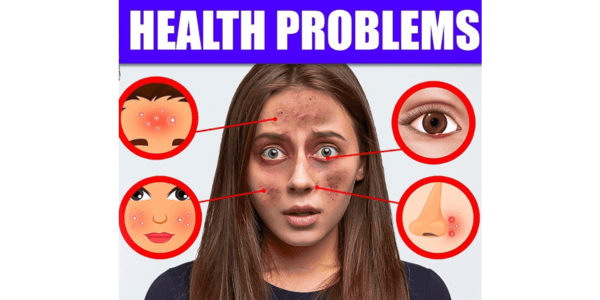Your face can provide valuable insights into your overall health. By observing certain facial indicators, you can gain a better understanding of potential health issues affecting your body. However, it’s important to remember that these observations should primarily be used for self-diagnosis and personal health improvement. It’s not recommended to diagnose others, especially without professional expertise. Let’s explore some common facial signs and their potential associations with underlying health condition.
1-Balding:
Hair loss concentrated on the top of the head may indicate elevated levels of dihydrotestosterone (DHT), a potent form of testosterone. Pumpkin seeds, green tea, and zinc can help reduce the enzyme responsible for converting testosterone into DHT, thus managing hair loss.
2-Losing Outer Eyebrows:
Thinning or loss of eyebrows’ outer part may be indicative of an underactive thyroid (hypothyroidism). Adequate iodine intake can support thyroid health.
3-Bloodshot Eyes:
Persistent bloodshot eyes may suggest liver issues or, if accompanied by redness on the inside of the eyelids, potential blood sugar imbalances or insulin resistance. A healthy ketogenic diet and intermittent fasting can help regulate insulin levels and reduce these symptoms.
4-Dark Circles beneath Eyes:
Dark circles under the eyes can be associated with insulin resistance and high insulin levels. Adhering to a healthy ketogenic diet and practicing intermittent fasting may help improve insulin resistance and reduce these pigmentation issues.
5-Bags beneath Eyes:
Swollen tissue below or on top of the eyes may indicate either blood sugar issues or kidney problems. High sugar intake can affect the kidneys, while maintaining stable blood sugar levels is crucial for kidney health.
6-Oily Skin, Acne, and Female Facial Hair:
Excessive oil production and skin issues like acne can be linked to high androgen levels. Zinc plays a crucial role in balancing estrogen and androgen levels. Polycystic ovarian syndrome (PCOS) in females may also contribute to these symptoms.
7-Cataracts:
Cataracts, the clouding of the eye’s lens, can be influenced by a high-carbohydrate diet and vitamin A deficiency. Consuming vitamin B1 (benfotiamine) and antioxidant-rich foods, along with managing blood sugar levels, may help prevent or slow down cataract progression.
8-Red Cheeks:
Rosacea or red cheeks can indicate high cortisol levels associated with stress or microbial imbalances. Natural remedies such as herbal antibiotics and probiotics, like sauerkraut, can be effective in managing this condition.
9-Grey or Brown Cheeks:
Grey or brown pigmentation on the cheeks, known as melasma, can be caused by estrogen imbalances. Reducing exposure to estrogen-mimicking substances and incorporating cruciferous vegetables or iodine-rich foods can help restore balance.
10-Peeling or Flaky Skin, Dermatitis, Dry Eyes, and Dry Hair:
Rough, scaly, or flaky skin, along with dry eyes and hair, can be signs of an omega-3 and omega-6 fatty acid imbalance. Increasing omega-3 fatty acid intake from sources like fatty fish or algae supplements can help alleviate these symptoms.
11-Blackheads:
Blackheads can be linked to a vitamin D deficiency. Ensuring sufficient sun exposure or considering vitamin D supplementation may help reduce their occurrence.
12-Cracked Corners of Mouth:
Cracks at the corners of the mouth may indicate a vitamin B2 deficiency. Consuming less refined flour products and increasing intake of vitamin B2-rich foods can alleviate this issue.
13-Cold Sores:
Herpes simplex type 1 causes cold sores, and antiviral remedies like garlic and zinc, along with fasting or intermittent fasting, can help manage outbreaks. Applying a cold compress or topical creams containing antiviral agents may also provide relief.
14-Pale or Yellow Skin:
Pale or yellowish skin can indicate liver or gallbladder issues. Increasing intake of liver-supporting foods such as beets, dandelion greens, and milk thistle, as well as reducing alcohol consumption, can aid in liver detoxification.
15-Swollen Face:
Facial swelling, especially in the morning, may be a sign of kidney problems or excessive salt intake. Reducing sodium consumption and ensuring adequate hydration can help alleviate facial swelling.
16-Wrinkles and Fine Lines:
Premature wrinkles and fine lines can be influenced by factors such as sun exposure, smoking, and nutrient deficiencies. Protecting your skin from the sun, quitting smoking, and maintaining a diet rich in antioxidants, vitamins C and E, and omega-3 fatty acids can help minimize the appearance of wrinkles.
Remember, while these facial indicators can provide clues about potential health issues, they are not definitive diagnostic tools.
Seeking guidance from a qualified healthcare practitioner is imperative to obtain an exact diagnosis and receive the suitable course of treatment for your specific condition.
Conclusion:
Your face can act as a mirror reflecting potential health concerns within your body. By paying attention to facial signs, you may gain insights into underlying imbalances or conditions that warrant attention. However, it’s important to approach these observations with caution and seek professional medical advice for accurate diagnosis and treatment. Maintaining a healthy lifestyle, including a balanced diet, proper hydration, regular exercise, and stress management, is essential for overall well-being, which can positively impact the health of your skin and face.
